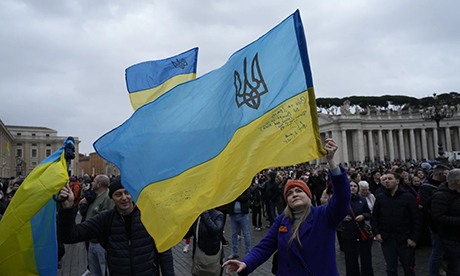Pope Francis’ recent remark urging Kyiv to show the “courage of the white flag” has drawn criticism from Ukrainian and allied officials.
Many perceive the statement as a call for Ukraine to surrender in its conflict with Russia.
In an interview recorded last month with Swiss broadcaster RSI, Francis advocated for peace talks brokered by international powers.
“I think that the strongest one is the one who looks at the situation, thinks about the people and has the courage of the white flag and negotiates” Francis said.
However, Ukrainian Foreign Minister Dmytro Kuleba promptly responded, affirming Ukraine’s unwavering commitment to the colours of his country’s flag and rejecting any notion of surrender.
“Our flag is blue and yellow. We live, die and win under it. We will not raise other flags” Kuleba posted on Sunday on the social media platform X.
Polish Foreign Minister Radek Sikorski echoed this sentiment. “How about, for balance, encouraging Putin to have the courage to withdraw his army from Ukraine? Peace would immediately ensue without the need for negotiations.”
Courage of negotiations
However, Vatican spokesman Matteo Bruni clarified that the Pope’s intention was to support “a stop to hostilities” and “a truce achieved with the courage of negotiations,” rather than advocating for Ukrainian surrender.
Bruni said that the journalist interviewing Francis used the term “white flag” in the question that prompted the controversial remarks.
Francis emphasised that negotiations should never be perceived as a sign of weakness but rather as a pathway to peace.
“When you see that you are defeated, that things are not going well, you have to have the courage to negotiate” he said.
While the Pope’s comments have sparked debate, Ukrainian President Volodymyr Zelenskyy has reiterated that any initiative in peace negotiations must come from Russia, the aggressor.
Francis has endeavoured to maintain the Vatican’s traditional diplomatic neutrality throughout the conflict.
His apparent sympathy towards the Russian rationale for invading Ukraine has however raised eyebrows. The reaction was notable when he referenced NATO’s eastward expansion contributing to regional tensions.
During Sunday’s Angelus prayer, Francis said he was praying “for peace in the tormented Ukraine and in the Holy Land.”
“Let the hostilities which cause immense suffering among the civilian population cease as soon as possible” he said.
Sources
Additional reading
News category: World.




